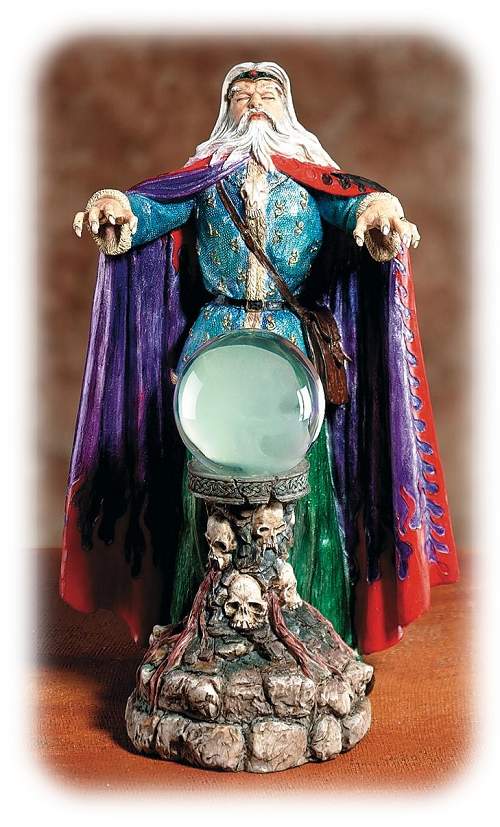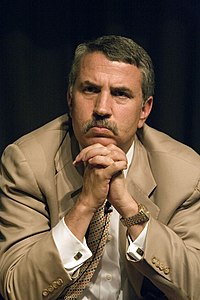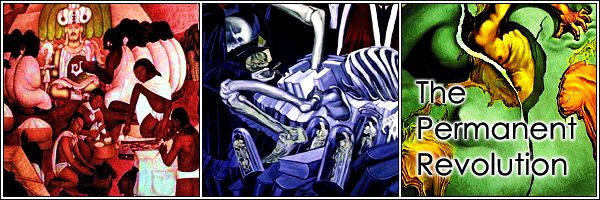I arrived in the lecture theater a half hour before the anointed time. The girl next to me is told she cannot save a seat for a friend. A young gentleman is (apologetically) seated next to her. Said friend eventually arrives, he moves to another spot. The reunited start chattering in Russian…
Tom Friedman is late. 18:31, 32, 36, 38, 42… Oh, bursting in through a side door is a short, portly man with a graying moustache. He looks a bit flustered carrying his coat. He climbs onto the platform and keeps looking up, and around him, swerving his head. He has a strange focused look as he discovers the projector, the screen which already has one of his PowerPoint slides on it, and visually explores his immediate physical space. I think, “He does seem a little ridiculous.”
The chairman gives a brief introduction, “…he needs no introduction. This is Tom Friedman, the most… I want to say the most well-known writer for the
New York Times. But Paul Krugman won the Nobel Prize yesterday.” The audience laughs and Friedman self-deprecatingly raises his eyebrows and opens his arms with his hands upwards, as though to say, “What can you do?” He is late, we skip some of the formalities.
Friedman begins. The lecture is about his book Hot, Flat and Crowded – do please buy as I will sign it later – and he wisely prefaces his lecture with a “This is a book about energy, but really, it is a book about America. It is an America-centric book.” Indeed his opening line, “America has lots its groove” didn’t seem to have much resonance with his cosmopolitan audience. But he warmed us to him quite quickly. He shows a recent Daimler advert in South Africa:
German engineering, Swiss Innovation, American Nothing
…with a bang: “That billboard really pisses me off!” The audience burst out laughing. And so began something I have never seen before: an emphatic, enthusiastic and pugnacious performance, part stump speech, part preach, part stand-up.
His arguments were couched in metaphor. Nay, he spoke in riddles worthy of a Himalayan guru or Delphic Oracle:
“We must be China for a day, but not two.”
“We are living in the age of Noah.”
“We must not be ‘Where birds don’t fly.’”
“We must go from red to green.”
They’re not actually nonsensical when put in context. In fact they got his various points across quite effectively.
 “We must not be ‘Where birds don’t fly.’” - Tom Friedman
“We must not be ‘Where birds don’t fly.’” - Tom FriedmanIt was his typical routine, one he had just performed in 24 lectures at US universities and repeated everything you find in his interviews with
Charlie Rose, his books and his columns. The performance, however, made him more likable and impressive I think than any of those other media. The metaphors were there ("America, it's like a rocket, with a leaky..") He got us laughing repeatedly too ("Withdrawal from Iraq: the biggest transfer of air conditioners in human history"). I don’t think sharing his gags verbatim in writing does him justice.
I raised my hand for questions, but sadly, with only 15 minutes, I did not get a chance to share my thoughts. I had prepared a question on whether he’d given any thought to the engineers failing to fix our environmental problems (I thought of
2001: A Space Odyssey and its (basically) EasyJet flights to the moon to get a sense of the unpredictability of innovation). You know, contingency plans, about possible state action, or changing our consumption habits or our mode of transportation perhaps…
 2001: The future was a better place yesterday.
2001: The future was a better place yesterday.The session was over, we clapped. We began leaving the theater. Immediate discussion with my peers emphasized the role that other countries might play (usually their own, one friend, a Brazilian journalist, talked about ethanol, a German girl talked about the policies of that country). For Friedman, the US mattered above all else, although that is normal as that is the audience he has committed himself to preaching to. (…the point of the world is to change it…) I think everyone was impressed.
We lined up for his book signing. Hot, Flat and Crowded currently has a 20 pound price tag so I did not actually own one (I felt a bit illegitimate throughout). The setting was not conducive to chit chat but in the back of my mind I wondered whether I should bring up the question I had wanted to ask during the session. I thought better of it. I climbed onto the platform where he was sitting, and he shook my hand (his was very soft) and I said “Hi, my name is Craig. I love your interviews on the
Charlie Rose Show.” He smiled, it looked kind, sincere, wishing to please, “I appreciate that, really.”
I wondered if that was the smile he always gave to the anonymous blur of individuals he encountered when signing 50 or 100 autographs. Really I had half-lied to him. In reality his fountain of metaphors on
Charlie Rose infuriate me (regardless whether his specific point was valid.) At the same time, if liberal triumphalists like Friedman or Zacharia move me to answer them, it is that I love to ha… Not hate, truly the wrong word, but contradict them. Being contrarian with certain people is one of things I enjoy most.
 He struck this pose, solemn consideration, when asked questions.
He struck this pose, solemn consideration, when asked questions.Thinking of my question, in some ways it raised an important point about putting all our eggs in one basket. In other ways, it missed his point. He had closed the session with a long quote that was supposed to be uplifting, by some inspirational American woman. He had a little catchphrase earlier which I thought was more effective:
Pessimists are often right. Optimists often accomplish things.
I can’t help but think this green stuff is a bit of a fad like the talk about Japan Inc. and Space Research (S.D.I., Eureka) in the 80s. I certainly don’t think it’s going to be anywhere as big as IT or that the engineers are going to fix all our problems. But Friedman isn’t engaging in dispassionate analysis. His words and thoughts aren’t dead, academic description of reality (“truth”). They are an impassioned attempt to rouse Americans to change (“action”). As he has performed in front of groups as diverse as politicians, to students, to oil men, he might even be effective. To be right is one thing, to persuade is of another order.






